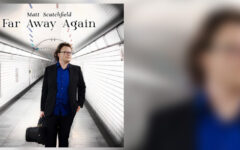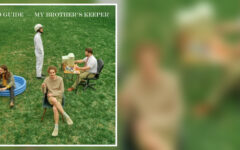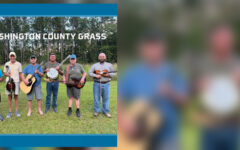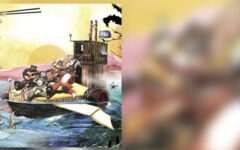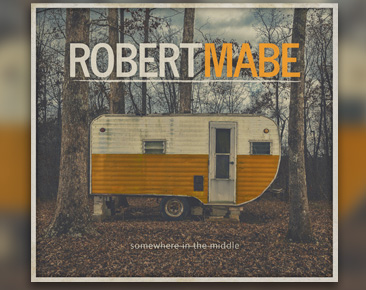
 I wasn’t sure what to expect upon encountering a bluegrass album that featured an “intro” and “outro” on the track listing. Would there be spoken word tracks? Some kind of wild and crazy instrumentation? Was this a bluegrass opera and I just hadn’t realized it? Thankfully, I was pleasantly surprised to find that Intro and Outro, the opening and closing tracks on banjo player Robert Mabe’s debut solo album Somewhere in the Middle, simply serve as inventive instrumental bookends to an interesting progressive bluegrass record.
I wasn’t sure what to expect upon encountering a bluegrass album that featured an “intro” and “outro” on the track listing. Would there be spoken word tracks? Some kind of wild and crazy instrumentation? Was this a bluegrass opera and I just hadn’t realized it? Thankfully, I was pleasantly surprised to find that Intro and Outro, the opening and closing tracks on banjo player Robert Mabe’s debut solo album Somewhere in the Middle, simply serve as inventive instrumental bookends to an interesting progressive bluegrass record.
Mabe, who holds down the banjo spot in West Virginia-based Drymill Road, has put together a capable crew of musicians to support him here, and they handle both jam-heavy musical interludes and more straightforward tunes with equal ease. With Patrick McAvinue (fiddle), Clay Jones (guitar), David Shepherd (bass), and Jack Dunlap (mandolin) as the core band, the picking throughout the album is clever, clear, and crisp.
After Intro, a brief taste of banjo and bowed bass, the band kicks into high gear with the medley What You Deserve/Into the Sun. The first half of the track is a strong progressive-leaning number with an angry edge; Mabe tells of a woman who only comes around late at night, and the man who always gives in. At about the three minute mark, the song transforms into an all-out jam guided by Mabe’s banjo and McAvinue’s fiddle. McAvinue also gives a strong performance on Molly, a cheery-sounding number about a country boy who falls for a girl who loves the city lights. His fiddling is bright and confident throughout the track.
Two songs speak of bottles, though with very different stories. The succinctly-titled Bottle is an upbeat number about the ways liquor has led the singer astray: “I try to make things right, but it gets harder every day.” Bottle of Tears lopes along at an easier pace, lamenting a heartbreak but pledging to move on. The song has an enjoyable melody, and the musicians work very well here to create a more restrained feel than most of the other songs on the album.
Mabe duets with wife Jillian on Black Waterside, an old Irish number set to backing guitar from Buddy Dunlap. Jillian sings with a bit of a lilt to her voice, fitting the song’s background and setting. The sparse arrangement brings to mind an ancient balladeer singing to a rapt audience in olden times, which gives the song a neat, authentic vibe. It’s one of only two on the album not written by Mabe. The other is the instrumental Music for a Found Harmonium, which incorporates two other Irish tunes, Musical Priest and Merry Blacksmith. It’s truly an excellent instrumental, lively and engaging, filled with impressive work from all the musicians and again guided by Mabe and McAvinue.
Robert Mabe may not be an extremely familiar name to the wider world of bluegrass, but his work here is top-notch. He is a very talented banjo player, and he’s also a strong singer, with a pleasant, steady voice. He has surrounded himself with high caliber, high energy musicians that make many of the songs here fun listening experiences. I’d definitely like to see what this group is like live.
For more information on Robert Mabe, visit his website at www.robertsbanjo.com. His new album is available now from Frogtown Music and to radio programmers at Airplay Direct.

